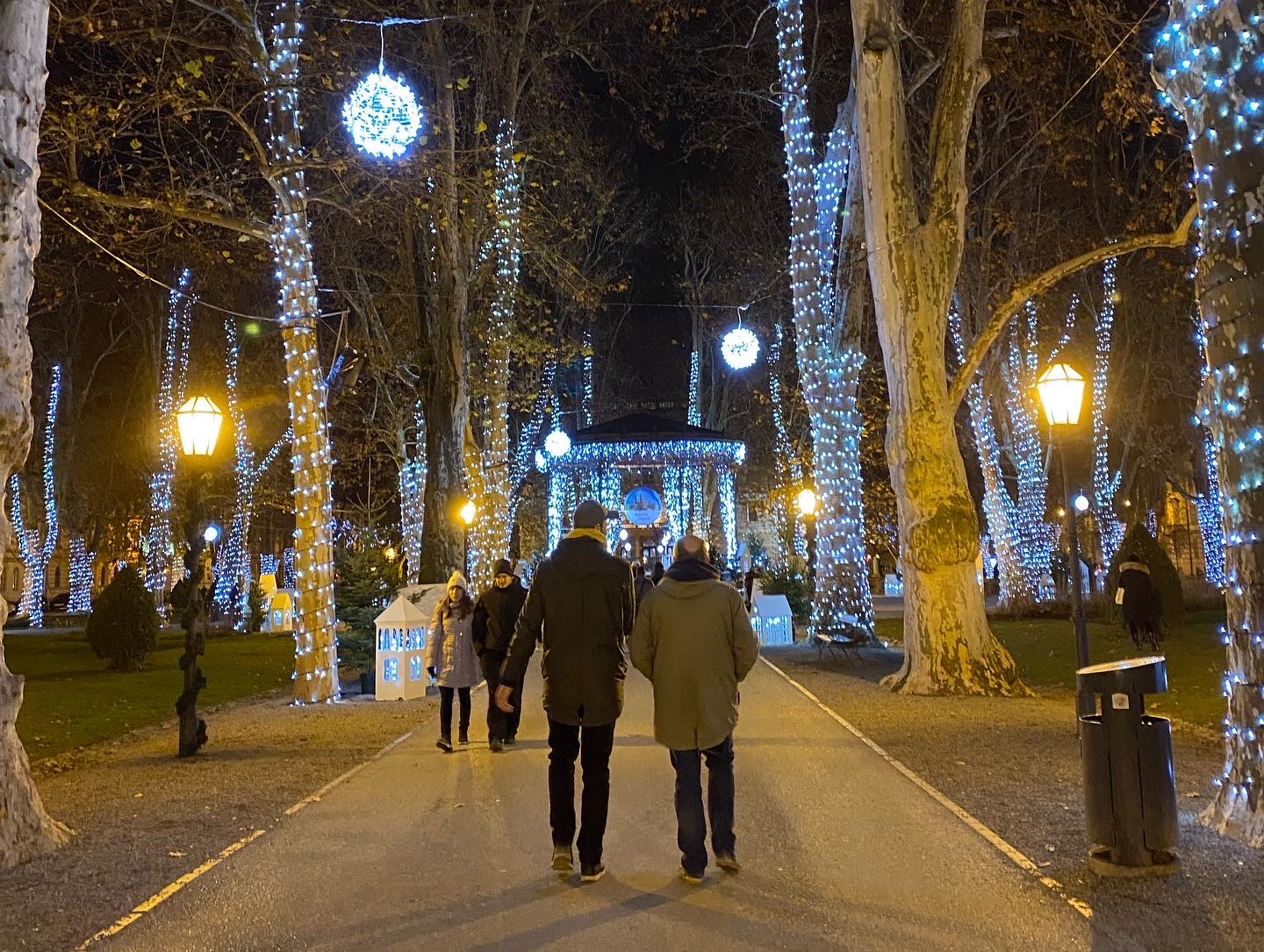5+ Years Living in Split: Expat Kimmy Chan from Hong Kong
May 19, 2022 - In our new TCN series, we uncover the lives of expats that have spent over 5 years living in Split. Next up, meet Kimmy Chan from Hong Kong!
Two idyllic weeks on a Croatian beach is very different from the realities of full-time living. So what is it really like to live in Croatia as an expat? In a new series on TCN, we meet expats who have lived here for 5 years or more, to find out from them the good, the bad, and the ugly of 12-month living in Croatia. Next up, Kimmy Chan from Hong Kong!
1. Tell us firstly how you came to Croatia? What motivated you to choose this slice of paradise and how long have you now been here?
I am Kimmy Chan, from Hong Kong, and have been living in Split for 9 years. I received my Croatian citizenship last year. I came to Croatia in 2007 because of an internship through an international student exchange program. Back then I had to choose between Croatia, Poland, the Czech Republic, and Ukraine, and honestly, I had no idea what Croatia is like, so I Googled it and the first photo I saw was the iconic golden triangle of the Zlatni Rat Beach on Brač Island. “It’s BEAUTIFUL and I have to see it!” I said to myself and that’s how I started my story in Croatia. During the internship, I met the love of my life through a friend and we had a long-distance relationship for 5 years. In 2012, I relocated to Split from Hong Kong and got married the year after. Now I have 2 daughters and 2 bunnies
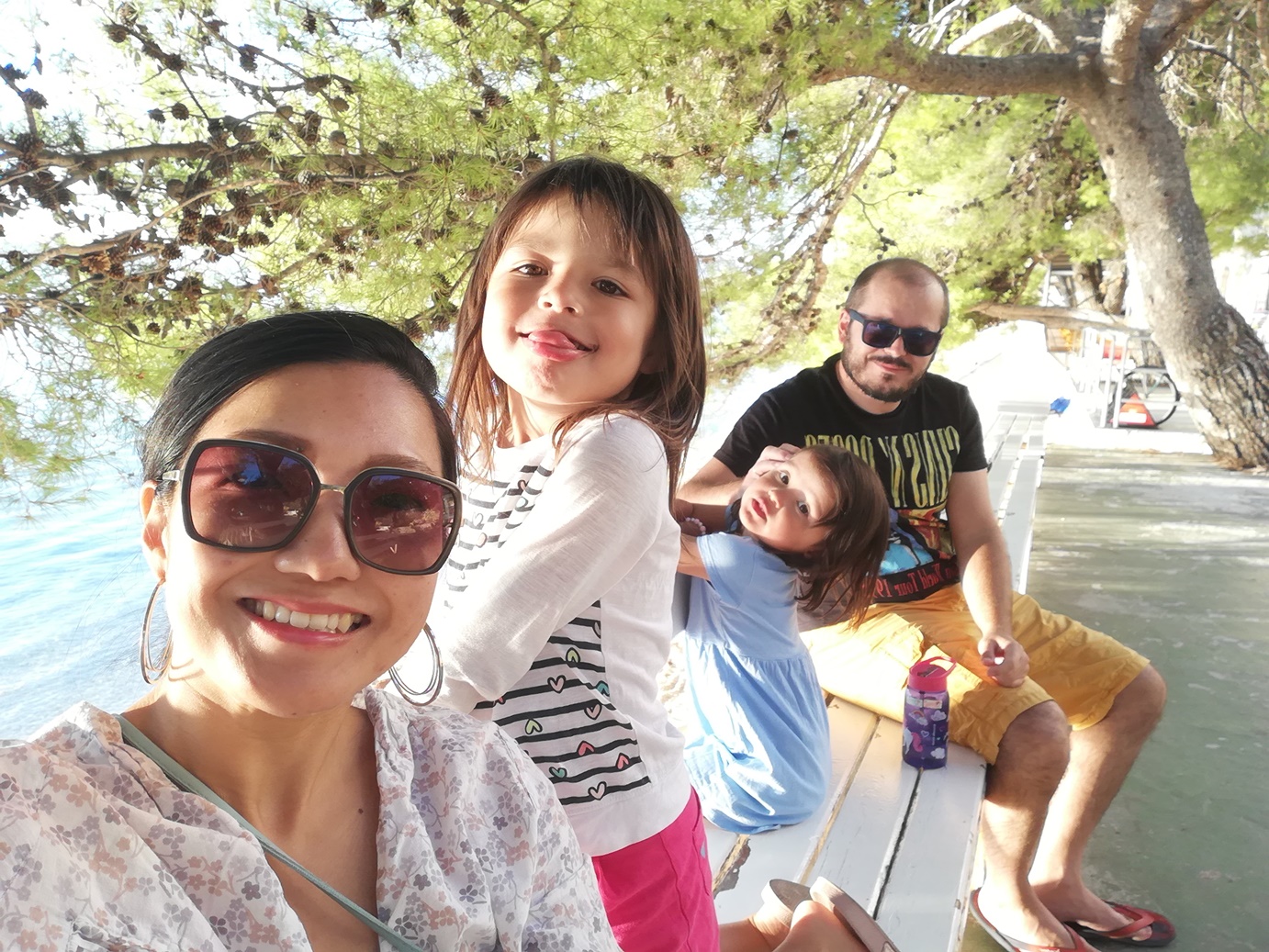
2. Looking back, what were your perceptions and expectations?
I actually experienced a lot of cultural shocks when I first came to Split in 2007. The first shock I had was on the very first day of my arrival. It was a Saturday and the supermarket back then closed at 2 pm on Saturdays and closed on Sundays. From that moment, I realized that Croatia is a country that cared more about family or rest time than money. The second thing that shocked me was the very limited choices for foreign cuisines. I remember there were only 1 Mcdonald's, 1 Mexican restaurant, and 1 Chinese restaurant in Split in 2007. Moreover, the menus in the fast-food stores and konoba everywhere were almost the same, and I wondered why people didn’t find it boring. Nevertheless, the biggest shock of all was the inefficient administration which is a well-known problem even for locals. I expected more European standards, working hard, diversity and open-mindedness in Split.
Despite the cultural shocks, I have been constantly amazed by how much Croatian people love their country, sports (especially football of course), jokes, and history.
3. After 9 years here, how have those perceptions changed. Do you now view Croatia differently?
In the last 9 years of living in Split, I have witnessed improvements in terms of touristic offers, acceptance of foreigners, and administration. It is exciting to see that Split/Croatia is advancing, slowly but surely. I would say that having some of my perceptions or expectations changed is not only because of the city/country’s endeavor, but also because I got to know more about the culture, lifestyle, and historical reasons, and I tried to embrace and accept them. Moreover, I have children now, so the “pomalo” and simpler lifestyle in Split which I used to find too slow is now great for me and my family.
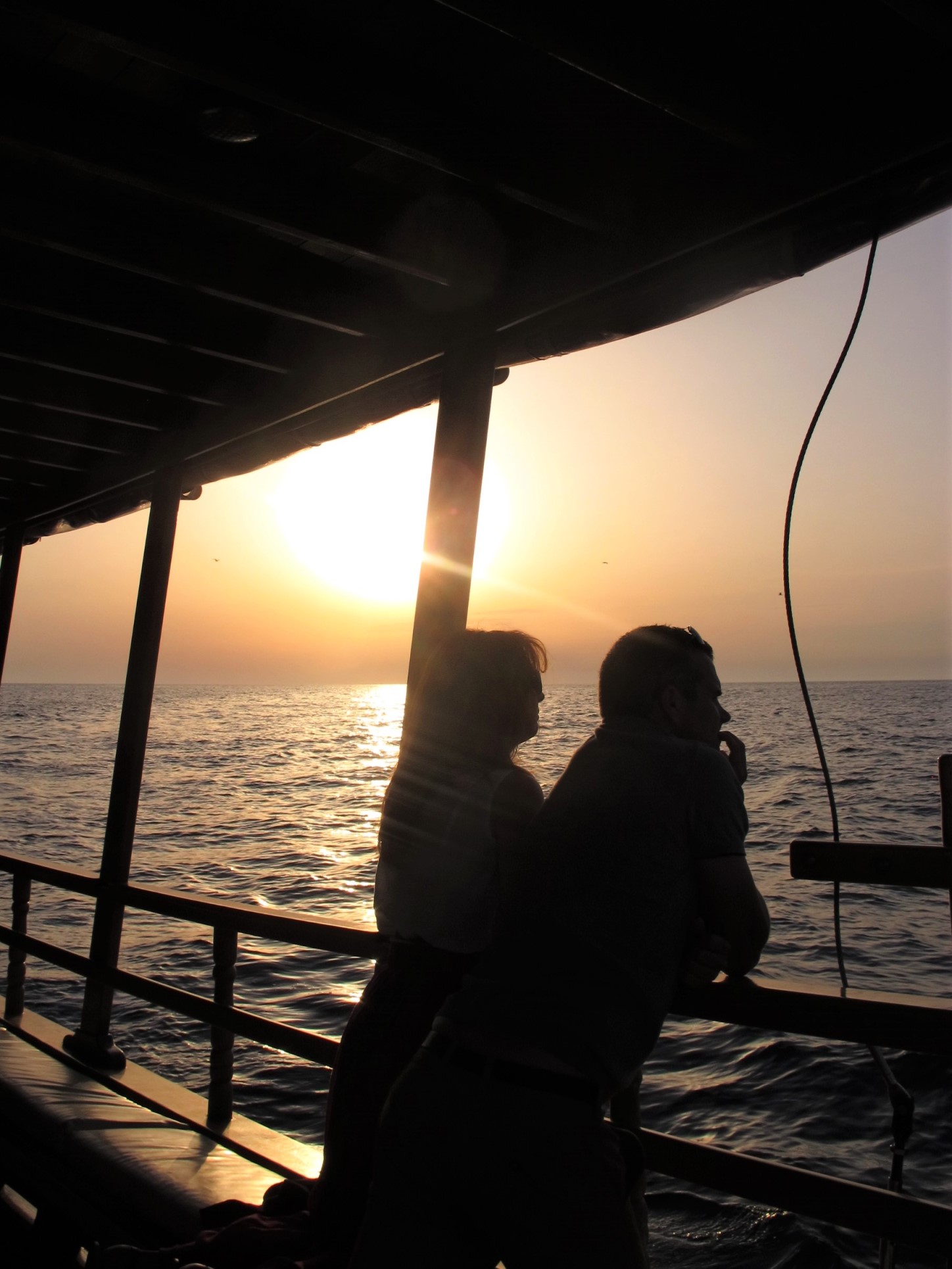
4. After your time year, the 3 things you love most about Croatia?
Water - I genuinely find the water in Croatia is very clean and I love drinking tap water in Split which is sweet and tasty. And of course, the Adriatic Sea is a gem.
Safety - Croatia is a very safe country. I feel safe walking alone at night, even on some quiet streets.
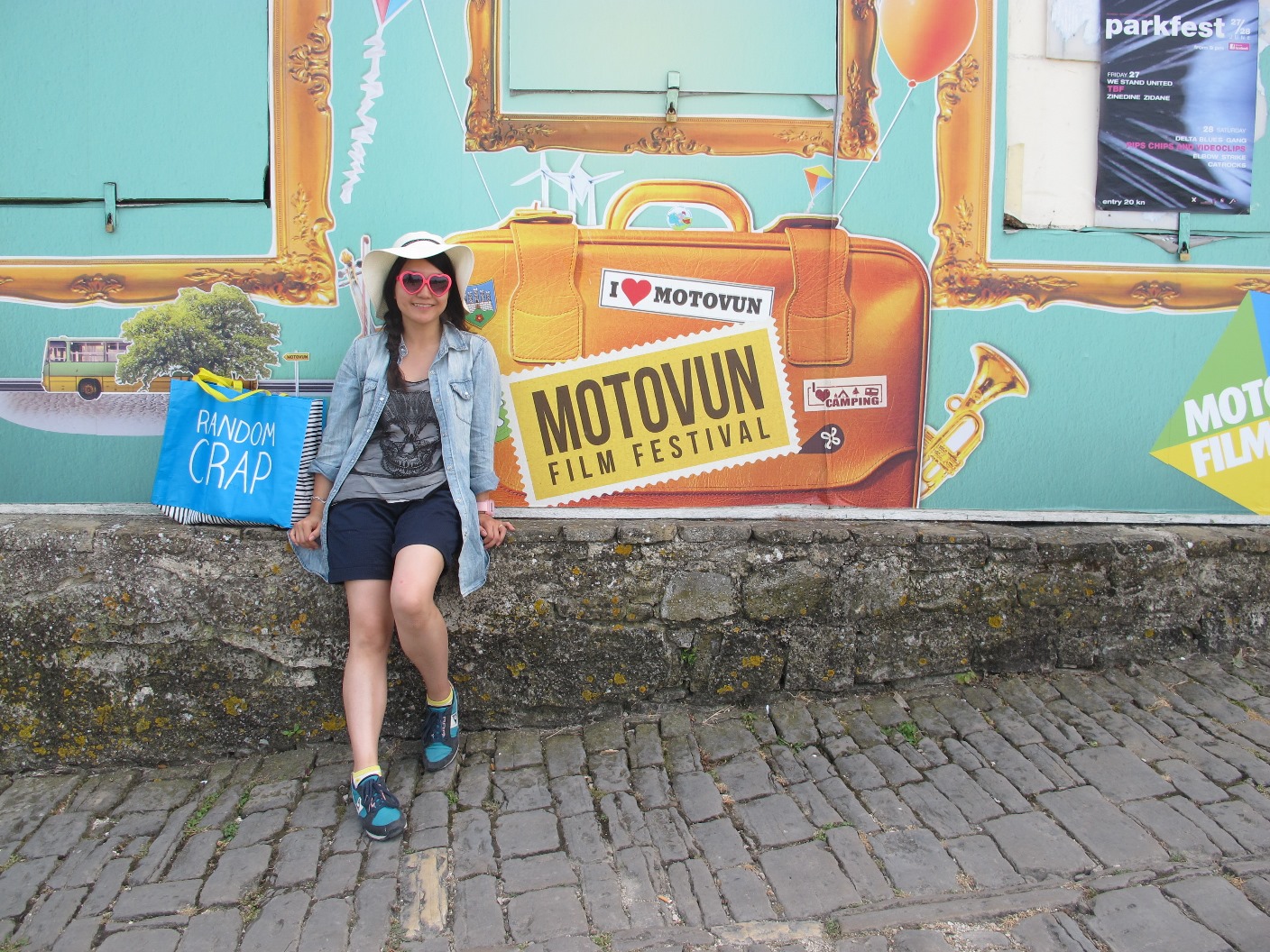
People - I am very impressed by how much Croatians love their country and how they are proud of their culture, food, nature, national teams, and so on. I met many Croatian families and they are all amazing hosts, always give the best to guests and make you feel welcomed. It may not be easy to be friends with locals at the beginning, but once the friendship is developed, they keep you dear to their hearts.
5. And the 3 things you would like to change.
The culture of “using connection”. Ever since the beginning of my life in Croatia, I have heard so much from the locals about how everything is done through connection. From getting a place in public kindergarten to getting a job in government, many people find it normal to use connections to have shortcuts or even get the deal directly.
Parking issues in Split. There are not enough parking spots in Split. It is always a headache to find parking, especially in the center. There are many “creative” drivers who like to leave their cars somewhere they are not supposed to.
The real estate prices in Split are crazy for both rental and buying.
6. Given your experiences, what advice would you give to any would-be expat thinking of making the move?
Look up information from expat groups on social media and expatincroatia.com. They are very helpful and informative.
The administration and paperwork is complicated, so be patient and it is very likely that you need a native Croatian speaker (e.g. lawyer, translator, local friend) to help you deal with it.
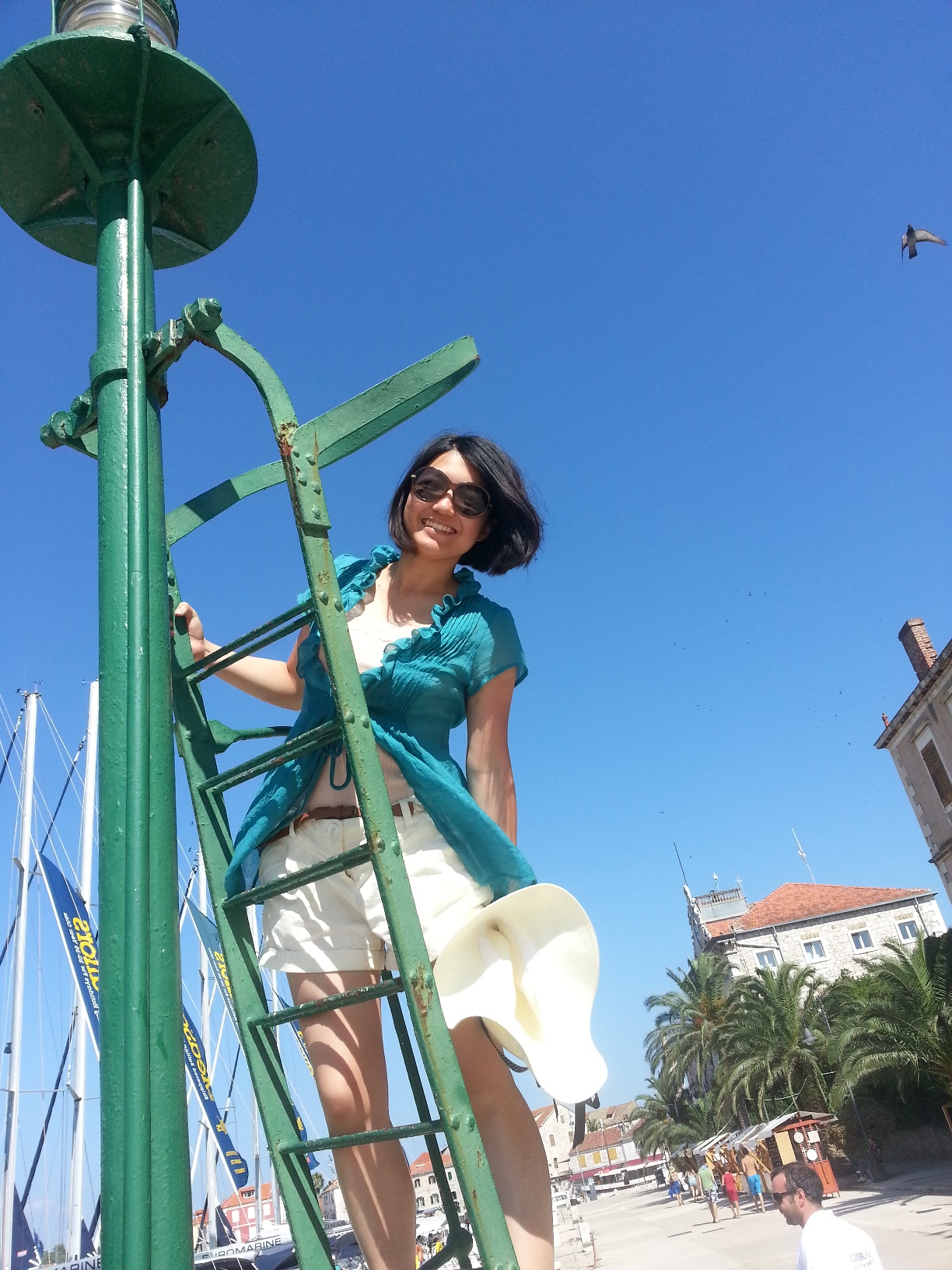
People from different regions in Croatia have different mentalities and work styles. In the southern part (Dalmatia), people, in general, are quite relaxed and less organised, so it is important to manage your expectation and find a place where you feel comfortable staying or work in.
7. The most beautiful place in Croatia, and why?
I love Istria. Love the sea, the green, and colour houses. Istria is not very big but it has a lot to offer.
Your favourite moment of your time in Croatia?
One of my favourites is the sunset dolphin-watching tour in Rovinj. The sunset was romantic, the host was friendly and so passionate to share homemade liquor with guests, the dolphins were lovely and Rovinj is a beautiful town. The tour was a very special experience.
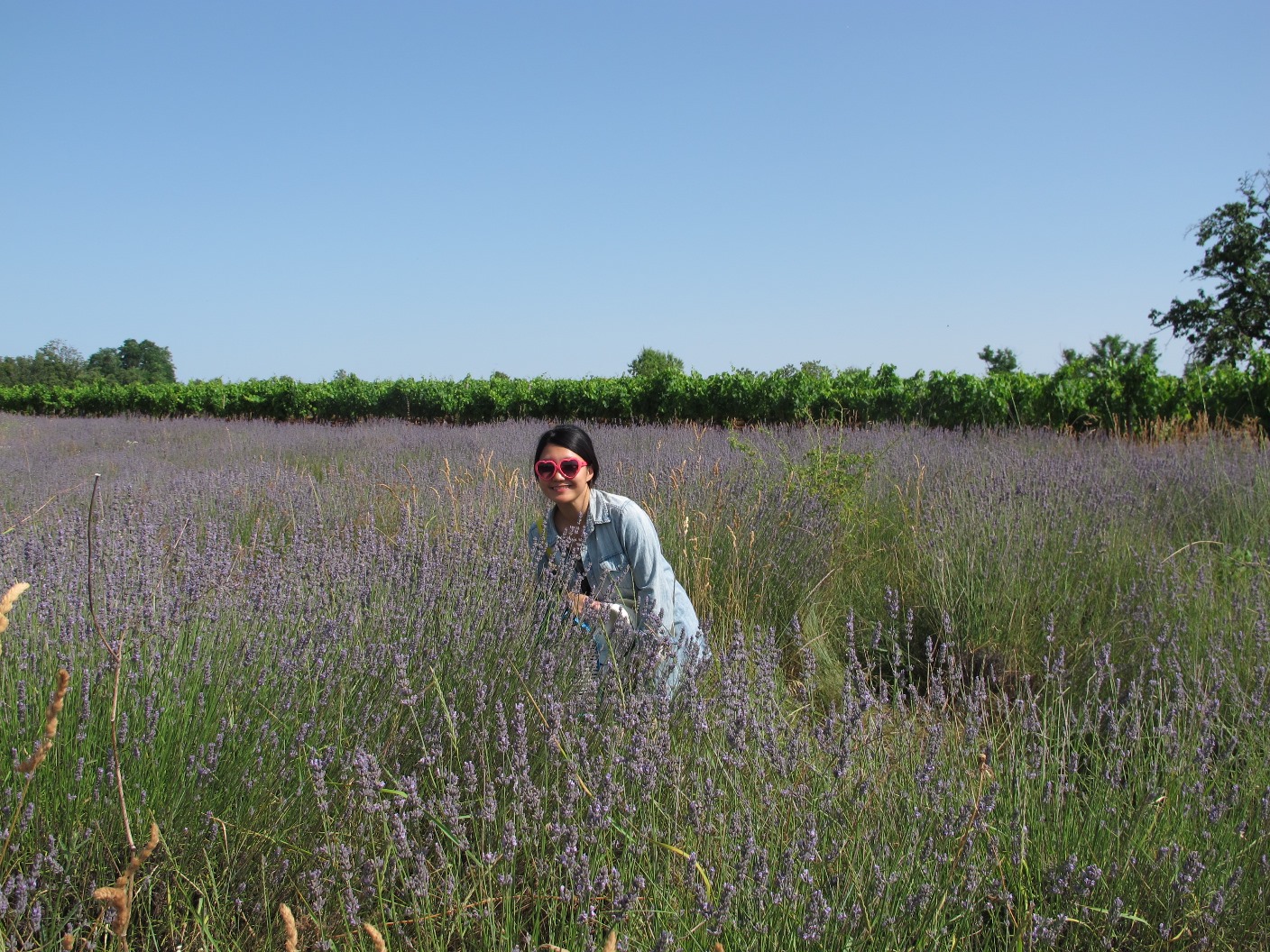
Are you an expat who would like to be featured in this series? If yes, please contact This email address is being protected from spambots. You need JavaScript enabled to view it. Subject Expat
For more, make sure to check out our dedicated lifestyle section.
The Two Types of Brit in Croatia: Pre and Post Brexit
May the 7th, 2022 - There are two types of Brit in Croatia. No, not ethnically, but politically. Back in 2016, the United Kingdom of Great Britain and Northern Ireland very narrowly voted to leave the European Union (EU) in a non-binding referendum, the likes of which are not the norm at all in a democracy of the UK's type.
Split almost entirely down the middle, the vote to leave the EU came as an enormous European and global shock, sending pound sterling tumbling and causing turmoil following over 40 years of the UK being one of the first and indeed among the wealthiest and most powerful member states. I won't get into the multitude of issues surrounding the Brexit vote, as more than enough time has passed for certain aspects of it to become clear, we've all read about them, and that isn't the point of this article.
Article 50 was eventually triggered, an article which enables a country to leave the bloc and which, according to its creator, was never really designed to be used as such a move was deemed deeply unlikely to ever happen. The UK ended up having numerous extensions, or Brextensions if you will, prolonging the exit process and seeing the country remain a member state for significantly longer than was initially envisaged.
The end eventually came, and the country entered into a year long transition period during which all EU law continued to apply to the UK, which included freedom of movement, one of the fundamental pillars of the functioning of the European Union. The transition period, which was spent tying up loose ends and seeing additional agreements and arrangements dealt with, ended on December the 31st, 2020, with new rules coming into force on the 1st of January, 2021. That date automatically created two sets of British nationals; those who had exercised their right to freedom of movement when the UK was an EU member state, and those who hadn't.
What does that mean for a Brit in Croatia?
Put simply and shortly, there are now two types of Brit in Croatia - a pre-Brexit Brit and a post-Brexit Brit. These two sets of people are treated entirely differently in this country, should they live here or want to live here, despite having the exact same nationality.
New residence permits
As a pre-Brexit Brit, you're not a third country national, and you're not an EU citizen, you have a category all to yourself, but it is up to you to be able to demonstrate that.
First of all, you need to request a new residence permit which separates you as a a pre-Brexit Brit in Croatia from a post-Brexit Brit. This card will state that you are protected by the Withdrawal Ageeement and you can request it from MUP. This is not a new residence application, just a scheme of declaration. You were supposed to request this before the end of June 2021 but some still haven't. You can still request it, your rights under the Withdrawal Agreement will be unaffected, but you may face an administrative fine for not respecting the aforementioned date (around 200 kuna). You can read more here.
For those who had temporary residence before the 31st of December, you need to download and fill in this form.
For those who already had permanent residence before the same date, you need to download and fill in this form.
Those who are already permanent residents will be asked less questions than those who are temporary residents. This is because permanent residents, regardless of their nationality, no longer need to abide by any conditions in order to live in Croatia permanently. Temporary residence are still ''provisional'', so to speak.
The rules for pre-Brexit Brits in Croatia:
If you're a Brit in Croatia and you were granted legal residence here before Brexit occurred, you're covered by something called the Withdrawal Agreement. That agreement provides what are known as acquired rights for those British citizens who had exercised their right to free movement when their country was an EU member state and as such moved to Croatia before the clock timed out on the 31st of December, 2020.
It's important to note that the ''pre-Brexit'' type of Brit in Croatia's time period also includes the transition period during which all EU law continued to apply to the UK.
As a pre-Brexit Brit in Croatia, you're afforded a series of special rights which clearly distinguish you from post-Brexit Brits (which we'll get into later) and see you treated much more like an EU citizen than a third country national.
The ins and outs
As a pre-Brexit Brit in Croatia, you had temporary or permanent residence granted and a document/permit to prove that before Brexit was concluded, when you were an EU citizen. As such, you'll continue to be broadly treated as such. This means that:
You are free to continue living and working (if you worked) as you did before, under the same conditions as you did before,
You are free to be self-employed or take up another form of employment without the need for a work permit,
You can continue to receive healthcare from the state (through HZZO) on the same basis as you did before,
You will be exempt from needing to fill out and pay for an ETIAS (European Travel Information and Authorisation System) when it comes into force,
You can enter and exit Croatia with your valid passport. You don't need any additional validity on the passport beyond the dates on which you're travelling,
Your entry into Croatia is always facilitated, but you must proactively show your residence permit demonstrating your rights along with your passport when entering. Your passport may be mistakenly stamped, but this is voided upon demonstration of your right to live in Croatia,
You can continue to drive in Croatia and will be issued with black printed license plates which separate you from post-Brexit Brits. You should bring your new residence permit proving your status when undertaking this procedure with MUP,
Your family members (such as current spouses and registered partners, parents, grandparents, children) will be able to join you and live in Croatia at any point the future,
Any children born after the end of the transition period will also be protected by the Withdrawal Agreement because you are, wherever they are born,
You can be gone from the country for five consecutive years without losing any of your rights or your permanent resident status,
All in all, your rights are largely unaffected by Brexit and you can continue living permanently in Croatia without the need to meet any conditions,
If you'd like to see more details about travel restrictions as a Brit in Croatia covered by the Withdrawal Agreement, click here.
Let's now move onto post-Brexit Brits, the British nationals who moved to Croatia, or who still plan to, now that Brexit and the transition period have come to an end. These British citizens are third country nationals, as despite being a European country, the UK is no longer an EU, EEA or EFTA member state.
The rules for post-Brexit Brits in Croatia:
As a Brit in Croatia who did not exercise their right to free movement when the UK was an EU member state, you are not afforded any special rights. You can no longer get residence easily as a British citizen like you could when the UK was part of the EU. Let's look at how you can gain residence as a Brit in Croatia now that EU membership is a thing of the past. You can apply for residence in Croatia if:
You're a British national but you already hold permanent residence in another EU/EEA/EFTA country
You're a digital nomad
You're a student in Croatia
You're coming here to start a company of your own
You're going to be working for a Croatian company
You're going to be undertaking scientific research
You're coming here to learn the Croatian language
You are already married or are going to be getting married to a Croatian citizen or an EU citizen living here
You're going to be volunteering here
You want to live here for one year only and you can prove the pre-payment of a year's worth of rent on a house, apartment, etc
All of the above grounds for application come with their own rules and requirements, and frankly, I'd be here for forever and a day if I went through each and every possible requirement and potential twist and turn. That said, these are concrete grounds for a residence application for a post-Brexit Brit in Croatia, and if you state one of them as your reason, MUP will be able to tell you what they require from you in your individual case. Here's what you will need in each and every case, however:
A completed application form for temporary residence which MUP will provide you with,
A valid identity document such as an ID card or British passport. Brits know that ID cards aren't really a thing in the UK, so the latter will most likely be the case. You must have three or more months longer on your passport than the period you intend to remain in Croatia for,
A criminal background check from the British police that is no older than 6 months, and if you hold permanent residence in another EU country, you need one from their authorities, too,
A health insurance policy. You can use a private health insurance police, a GHIC, or an EHIC if you live in another EU country and have health insurance there,
Proof of accommodation, and as such a registered address in Croatia. You'll then need to show your proof of ownership, a valid rental contract, or the accommodation provider/landlord can accompany you to MUP if you have a different situation,
Proof of sufficient funds to support yourself unless you're applying based on family reunification with a Croatian spouse,
A photograph (30x35 mm) which will either be taken at MUP upon approval of your application, or at a nearby photo studio which provides photos for identification documents. There are usually several such facilities within walking distance from an administrative police station,
An application fee to be paid into the Croatian state budget,
Your rights as a post-Brexit Brit in Croatia:
You will require a work permit in order to gain lawful employment in Croatia,
As a temporary resident, you will need to be in the country for a certain amount of time each year before being able to apply for permanent residence. Click here for travel restrictions for third country nationals, and for detailed information about time you must wait before you can apply for permanent residence, click here,
You may need to get your professional qualifications recognised if you want to work in a profession that is regulated in Croatia,
If you plan to study in Croatia, you must meet all of the requirements before you travel here. It's wise to contact the relevant higher education provider in Croatia to check what fees you may have to pay during this process,
The UK has a double taxation agreement with Croatia so that you don't pay tax on the same income in both countries. This remains the case regardless of the EU or of Brexit,
You can't renew or replace your United Kingdom, Gibraltar, Jersey, Guernsey or Isle of Man licence if you live in Croatia, but here's what you can do,
Once you are able to apply for permanent residence, you will be afforded vastly different (and much more favourable rights) which are very similar to those enjoyed by nationals, here they are:
You are free to come and go from Croatia as often as you please, as long as you aren't outside of the country's borders for longer than two consecutive years,
You are free to access education,
You can undergo professional development of any kind,
You are free to take up employment without any need for permission or a work permit
Student (but not state) scholarships,
Child benefits (allowance),
Social/state benefits (welfare)
Various forms of applicable tax relief,
Free access to the goods and services market,
The freedom to become a member of an association or organisation which represents either employees or employers,
You can live in Croatian permanently and without any conditions,
SOURCES: MUP, Sredisnji drzavni portal, Europa.eu, GOV.UK
For everything else you need to know as a Brit in Croatia, keep up with our lifestyle section.
Three, Four or Five Years for Croatian Permanent Residence? It Depends
May the 4th, 2022 - Most people living in Croatia have it firmly stuck in their heads that first they must live with lawful temporary residence (uninterrupted, might I add) for a period of five consecutive years before applying for permanent residence after five years and one day. Is that the only path to Croatian permanent residence, however? No, not quite. Let's take a deeper look.
Croatian permanent residence after five years
Croatian permanent residence is typically obtained after five years and one day of living legally in Croatia with temporary residence. If you're from the EU/EEA/EFTA, that means you must be in the country for at least six months per calendar year while you hold temporary residence, and that logically means you can also be out of Croatia for six months per year without losing your residence or any of your rights here.
If you aren't from an EU/EEA/EFTA country, then your situation is a little more strict. You need to be in the country for much longer each year, with tighter restrictions on your movements abroad until you transition to permanent residence at the end of your five years.
What does that mean, exactly?
You're free to be outside of the territory of Croatia on multiple different trips for a period of up to 90 days (three months) or 30 days from the day you're given the green light and your application for temporary residence for one year is granted to you by MUP.
A little like levels on a game, this ''freedom'' time increases as your time approved to be living here does, so you can be outside of the country on multiple different trips for up to 180 days (six months), or a maximum of 60 days in one stretch from the day you're approved for two years of temporary residence. The latter is also the case if you're registered as a Croatian citizen's family member.
The reason it's worth explaining the ins and outs of that is because many people assume MUP doesn't or cannot check where you are and that once you have legal temporary residence in Croatia, that's it until your next application, that is often the case, but may not be. They might never check up on you, especially if you're an EU citizen, but they can, so it's worth keeping it in mind. There are exceptions to these rules of course, much like with everything else in Croatia, and if you have a valid reason to be outside of the country for a longer period, such as illness, childbirth, military service, etc, you will likely be given permission to remain outside for longer, but you must explain this and ask.
Croatian permanent residence after four years
A little law change came in somewhat recently, making it possible for the spouses and other relatives of Croatian nationals to apply for Croatian permanent residence after four years as opposed to the typical five.
What does that mean, exactly?
If you're the family member or life partner of a Croatian citizen and you have been granted temporary residence for a continuous period of four years for the purpose of family reunification or life partnership, then you have the right to apply for Croatian permanent residence after four years of uninterrupted residence.
Croatian permanent residence after three years
In certain cases, individuals can apply for Croatian permanent residence after three years, completely removing the need to sit and wait for a further one or two. These cases tend to be a bit more complex, and they only cover quite a small number of people.
What does that mean, exactly?
If you're classed or declared to be a member of the Croatian people with foreign citizenship or you're stateless (you aren't a citizen of any recognised nation) who can prove your status with a certificate issued by the state administration body responsible for relations with Croats outside of the Republic of Croatia, and if you've been found to have returned with the intention of living permanently in Croatia, you can apply for permanent residence after holding temporary residence (uninterrupted) for a three year period.
If, until the day of you handing in your application, you've been granted temporary residence in Croatia for three consecutive years, and you've been classed as a refugee for at least ten years, you can apply for Croatian permanent residence.
If you're the child of third country nationals who already hold Croatian permanent residence, you too can apply for Croatian permanent residence after a three year period (of holding uninterrupted, lawful and documented temporary residence).
Croatian permanent residence under more favourable terms (discretion, highly individual cases)
In some cases, Croatian permanent residence can be granted under different rules. This regards highly specific situations involving the breakup of the former Yugoslavia, the Homeland War, and the situations which occurred immediately after in an administrative sense and which involved displaced persons.
What does that mean, exactly?
If you hold the citizenship of a third country, so a non EU/EEA/EFTA nation, and you had a registered residence in the Republic of Croatia on the 8th of October, 1991, and if you're the user of a return programme, you can apply for Croatian permanent residence. You will need to provide MUP with an array of documentation proving your right to your claim which will differ from the usual procedure.
SOURCES: MUP
For more on Croatian permanent residence, keep up with our lifestyle section.
Croatian Language Test for Permanent Residence, Yes or No?
May the 3rd, 2022 - One of the most common questions one tends to read on expat groups small and large from up and down the country from residents of Croatia nearing the golden five year mark of temporary residence is Do I need to pass a Croatian language test for permanent residence?
Understandably, this question is usually bombarded with answers from different people from across the world who have residence based on all sorts of different reasons, from marriage to druge svrhe (other purposes) and everything in between, all of whom were approached differently by the authorities.
What Zdenka at the desk in Rijeka says to someone applying who happens to have a Croatian (or indeed Austro-Hungarian) distant relative and what Mirna at Petrinjska in Zagreb says to someone applying based on family reunification will likely be very different. So, let's get to the point. Do you need to take a Croatian language test for permanent residence? The answer is sometimes yes, sometimes no. Helpful, I know. Let's look into who has to take it and who doesn't.
EEA/EU/EFTA citizens
If you hold the citizenship of a European Union, European Economic Area or European Free Trade Association Area country, you do not need to take a Croatian language test for permanent residence. Pure and simple.
The EFTA countries are Iceland, Norway, the Principality of Liechtenstein and Switzerland, none of which are EU or EEA member states or part of the Customs Union and negotiate trade deals separately to the EU, but which do enjoy a similar free trade agreement with the European Union.
Third country citizens
Third country citizens or nationals are individuals who don't hold the citizenship of an EU, EEA or EFTA country. These people typically do need to sit a Croatian language test for permanent residence. The language test is at the B1 level and includes understanding, reading, writing, speaking and perhaps the worst of all for anyone who has spent time around the Croatian language - grammar.
If you pass this test, you'll be presented with a certificate from any of the education institutes which run these tests which you can then take to MUP as part of your permanent residence application. A list of such institutes running the tests can be found on MUP's website so that you can pick and contact the one closest to your address.
Exceptions for third country citizens
You do not need to take a Croatian language test for permanent residence if you're 65 or over and are unemployed, if you're of pre-school age, or if you've already completed your compulsory (mandatory) primary and/or secondary in Croatia, or if you've completed higher education here.
Citizens of the United Kingdom of Great Britain and Northern Ireland who had legal residence in Croatia before the 31st of December, 2020
British citizens who had legal residence in Croatia before the 31st of January 2020 and who as such fall into the category of those who are protected by the Withdrawal Agreement do not need to take a Croatian language test for permanent residence.
British nationals were once also EU citizens, and as such had the rights to freedom of movement, one of the fundamental pillars of the European Union, until the 31st of December, 2020, when the UK's transition period out of the bloc ended. Those British nationals who held temporary or permanent residence before the UK's withdrawal from the bloc, more precisely before the end of its transition period, are protected and have acquired rights in Croatia. Their residence status and rights are unaffected.
That said, they did need to apply for a new residence document which demonstrates their protected status before the end of June, 2021. British citizens who are in this category who have not yet got their new document can still do so and their rights will not be affected, but they may face a small administrative fine for not having made the application before the specified date. The application for the new document is not a new residence application, but merely a demonstration to MUP that you are owed it. If you already held permanent residence in Croatia before the end of the UK's transition period, this will be an extremely easy exercise.
Citizens of the United Kingdom of Great Britain and Northern Ireland who did not hold legal residence in Croatia before the 31st of December, 2020
If you're British and didn't exercise your right to free movement across the EU before the aforementioned date, you fall under the category of a third country national and as such need to take a Croatian language test for permanent residence.
Those married to Croatian citizens
If you're an EU/EEA/EFTA citizen married to a Croatian citizen and are applying for permanent residence (which in this case can now be applied for after four years as opposed to five), you do not need to take a Croatian language test for permanent residence based entirely on your own nationality which affords you certain rights in Croatia.
If you're a third country national married to a Croatian citizen and are applying for permanent residence (which is also now after four years in your case, too, not five), you may be asked to take a test, and you may not be. I realise how unhelpful that is, but people have vastly different experiences when it comes to this depending on when they've applied, where they live (and as such which administrative police station they've used), and quite frankly, what side of the bed the clerk woke up on that morning.
For more on nationality and residence in Croatia, keep up with our lifestyle section.
Croatian Retirement Heaven: International Living Ranks Country Highly
February the 15th, 2022 - While retiring for Croats on a Croatian pension might not be a song and dance, Croatian retirement for foreign nationals with foreign pensions is quite the dream for many. The magazine International Living has ranked the country very highly indeed.
As Poslovni Dnevnik writes, faced with a sharp drop in living standards after retirement, many retirees spend time thinking of environments that offer a better life for the same amount of money. Croatia is one of the most desirable destinations for foreign retirees, and this year it was on the list of the best destinations for retirement.
Every year, the International Living magazine produces an international retirement index that promotes the best countries for living in retirement, and Croatian retirement for foreigners looks tempting. The survey involves a large number of correspondents and associates from around the world, and the calculation of the index looks not only at the cost of living, but also at many other factors that affect the quality of life.
The choice is intended primarily for Americans and other Westerners, who can often afford a better quality of life in the offered destinations than in their homeland.
In addition to the cost of living, climate, political stability, the level of healthcare offered and its cost, the development of infrastructure and the degree of environmental protection are the most important factors when it comes to scoring. Less tangible factors that have an important impact on the quality of life are also measured, such as the availability and quality of entertainment and cultural content, the attitude of local residents towards foreigners, as well as the level of general personal safety.
This year, Croatia and Croatian retirement for foreigners was included among the pensioners' paradises, and it ranked 23rd on the list of the 25 most attractive destinations. We received the most points for "ease of integration", which includes the general goodwill of the local population towards foreigners, the ability to adapt to local customs, the level of cultural content, the offer of outdoor activities and the adaptation of various content to foreign users.
Croatia is also attractive due to its low cost of living, and it also ranks well in terms of healthcare. The level of infrastructure is also highly valued, which means the availability of telecommunications services, a quality road network and efficient public transport. Croatia received the fewest points in the categories "possibility of obtaining citizenship" and "benefits for the elderly", and it is still relatively weak in terms of the quality of civil services.
Other countries with a high index also offer a combination of low costs, different benefits and nice weather. Along with Panama and Portugal, Costa Rica, Mexico, Ecuador, Colombia, France, Malta, Spain and Uruguay are among the top 10, writes tportal.
For more, check out our lifestyle section.
Croatian Reddit Recommends Osijek to Would-be Foreign Residents
February the 1st, 2022 - Croatian reddit is a funny place on the Internet to be, with memes and jokes galore, as well as commentary on the political situation, foreign affairs, and advice on gaining citizenship to how to make traditional Croatian dishes. Croatian Reddit is also excellent for recommendations, and a Russian user asked the sub its opinion on the best place in the country to live, with an intention of making the move. One Eastern Croatian city came out on top.
As Poslovni Dnevnik writes, a Reddit user from Russia addressed Croatian Reddit users recently and asked which Croatian city was the best choice for him to move to. He and his wife are planning to move to Croatia, and he wanted to find out which part of the country has the best living conditions, whether it is better to rent an apartment or a house, whether he can survive on 2,000 US dollars a month and which city is quiet without being expensive. Where better to ask than on Croatian Reddit?
The city that received the most praise is the Eastern and often (wrongly) overlooked City of Osijek.
It's full of greenery, everything is accessible and close at hand, public transport is always available and punctual. It's cheaper, Croatian Reddir users say, than living in Zagreb and the cities down by the deeply desired coast, and it is still quite large by Croatian standards.
“Shopping centres, colleges, high schools, almost everything is a 15-25 minute drive away, even in the case of heavy traffic. In addition, according to what I heard, the rent in Osijek isn't insanely high,'' wrote one Reddit user.
Some said that the surroundings of Zagreb are excellent when you look at the ratio of costs and the proximity of the capital itself. Zapresic, Samobor, Velika Gorica, Dugo Selo - all of these are places that offer a more peaceful way of life, reports Vecernji list.
Although some said that Dalmatia should be avoided because it is depressing in winter and overcrowded in spring and summer, there were those who praised the surroundings of Split.
''Trogir, Podstrana, Omis, Dugopolje… Very cheap accommodation can be found there, and the sea is only a few minutes away by car,'' Croatian Reddit users say.
For more, check out our lifestyle section.
Choosing Between Living in Zagreb or Dalmatia, Two Years Later
December 16, 2021 - After getting to know the capital of Croatia better this year, I was already imagining my life in Zagreb. However, one has to think twice before leaving Dalmatia behind so easily.
Seven months in Rijeka, and eight in Podstrana, which is located about 20 minutes south of Split. That is the time that, until March of this year, I had spent in Croatia since I arrived for the first time in October 2019. At that time I felt an urge to get to know the country beyond the coast, and Osijek was my main choice. Unfortunately, things did not work out for me to move to Slavonia, and my next destination would be Zagreb.
The impact of Zagreb on me was immediate. Parks everywhere, such a walkable city, a great public transport system, things to do everywhere and at all times, movement, life, great food... Zagreb has it all. One of the reasons why I went to Zagreb was to find a job, and this was the case in my second week there. I interpreted it as a sign to realize that my place was there, in the capital of Croatia.
A short video that I recorded and edited on the way from Split to Zagreb, with an emphasis on the landscapes between the two cities.
I would have liked to continue this article by saying that, after a few months, I managed to settle in Zagreb. But one thing led to another, and I ended up in Split after four months. Some will believe that because it was summer the decision was a bit obvious, but at some point, I really saw it possible to spend those hot months away from the coast. In July I returned to help my parents with our accommodation business during the season, and I was not yet financially ready to pay rent. In Zagreb, I was residing in student accommodation thanks to a scholarship, so that made it easy for me to live there.
The view from Lanterna Beach, between the town and the ferry port of Stari Grad, on the island of Hvar. Heaven on earth. (Photo: Jose Alfonso Cussianovich)
I cannot say that I returned with sadness in my soul - the summer was spectacular, and for me, it is always special to be close to my family. The job I have allowed me to work in any corner of the country, so it wasn’t a big deal to move again. The reception of dozens of tourists who arrived during the season and the several beach days made summer go by very quickly for me. In the blink of an eye, it was already September. The climate in Dalmatia was the same or even more pleasant than in the previous months. I was aware that summer 2021 was slowly disappearing, but beach days, ice-cold beers, and air conditioning were still part of the routine. I still remember with great happiness the visit of my cousins, with whom we visited one of my favorite places - Stari Grad, on the island of Hvar. September was indeed a special month.
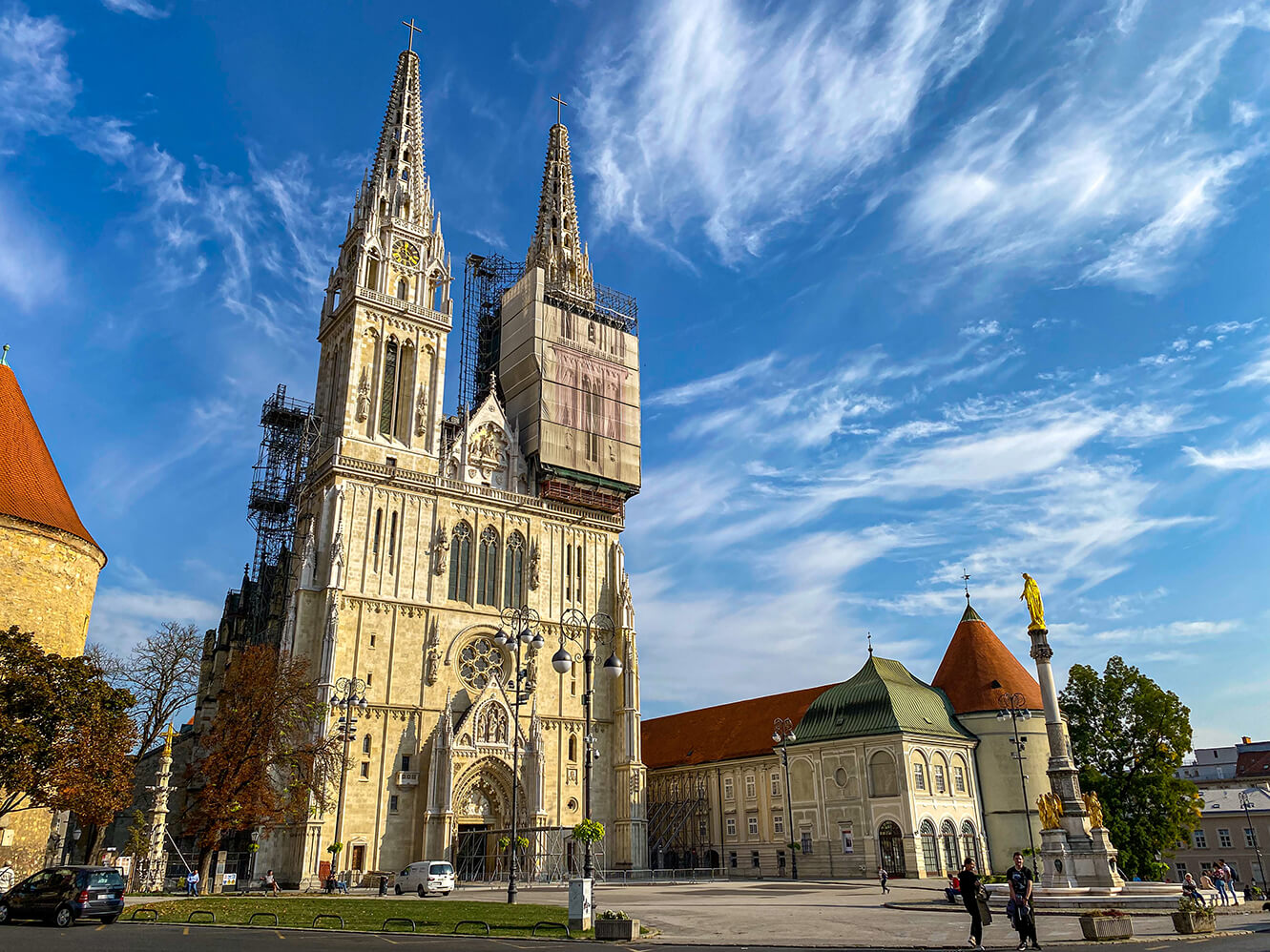
Zagreb Cathedral, when I visited the capital of Croatia in early October. (Photo: Jose Alfonso Cussianovich)
October came, and I noticed the changes when I made a short trip to Zagreb. The colors of the forests that accompany the E65 and E71 roads changed from strong green to reddish. The week I was in Zagreb, earlier that month, reminded me how much I missed the things I liked about it. That's when I said that, as a goal, I would come back at least once a month even if it's just to visit.
Shortly after that brief stay, I managed to convince my parents to go back together to spend a few days in the capital. We stayed around the corner from the Cathedral, and we really had a great time in those few days.
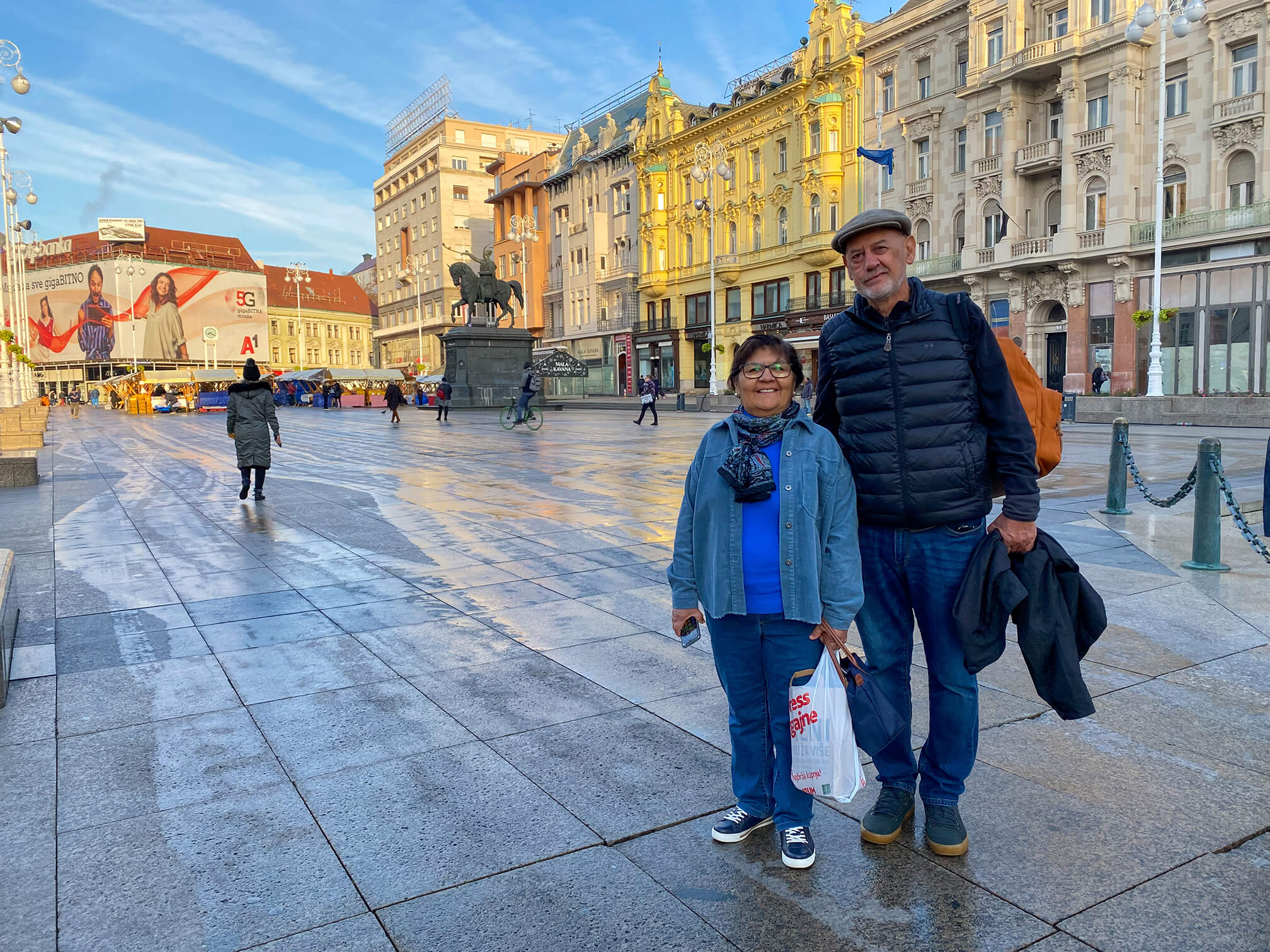
My parents, in Ban Josip Jelačić square on our little trip to Zagreb in October. (Photo: Jose Alfonso Cussianovich)
My next visit would be last week when it was time to celebrate TCN's Christmas dinner. It was the first time I went to Zagreb with a pre-winter ambiance. Despite the cold weather, I have never seen a city as lively and vibrant as Zagreb is in Advent. I kept reminding myself of the many benefits that living in Zagreb entails, which even go beyond the lifestyle, such as the efficiency of public institutions or the ease of meeting new and valuable people even in such everyday situations.
Zrinjevac Park in Zagreb, during Advent. (Photo: Jose Alfonso Cussianovich)
By then, I was already thinking about the cost of living there and it even occurred to me to try to convince my parents that living in Zagreb and running our business in Split at the same time was a very feasible alternative.
But it was time to return to Split, and in less than a week, I reconsidered everything I had been thinking throughout this year about living in Zagreb. Five things made me change my mind.
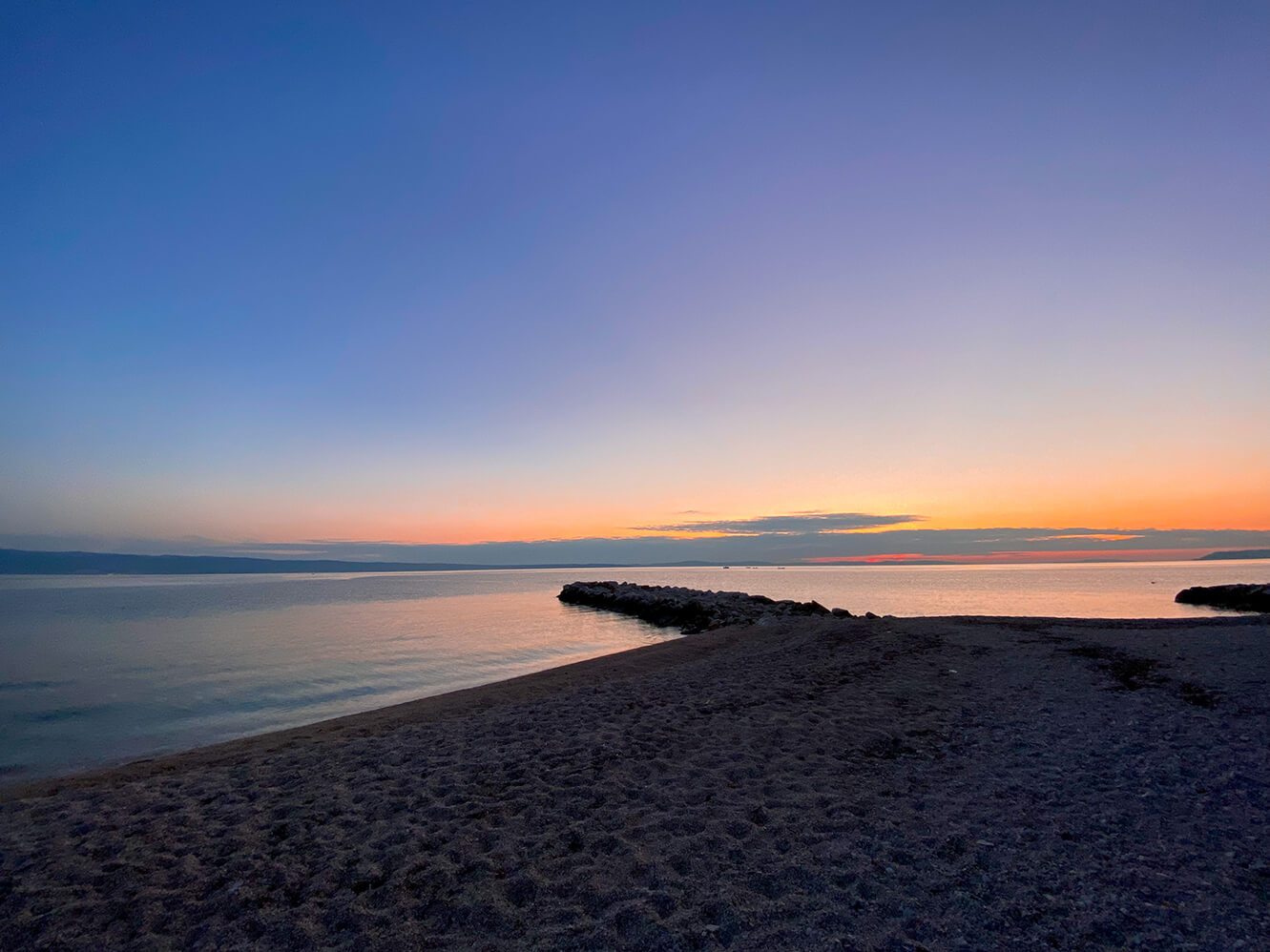
One of the many scenes that one can find when walking along the beaches of Podstrana. In this case, between sv. Martin and the Le Meridien Lav hotel. (Photo: Jose Alfonso Cussianovich)
First of all, I decided to walk along the beaches of Podstrana, from Saint Martin to the Le Meridien Lav hotel, during sunset. It is definitely not the ideal time to take a dip in the sea, but just being close to the Adriatic Sea is more than enough for me and I couldn't afford to be so far from the sea. This almost spiritual walk has been crucial for me to think things over.
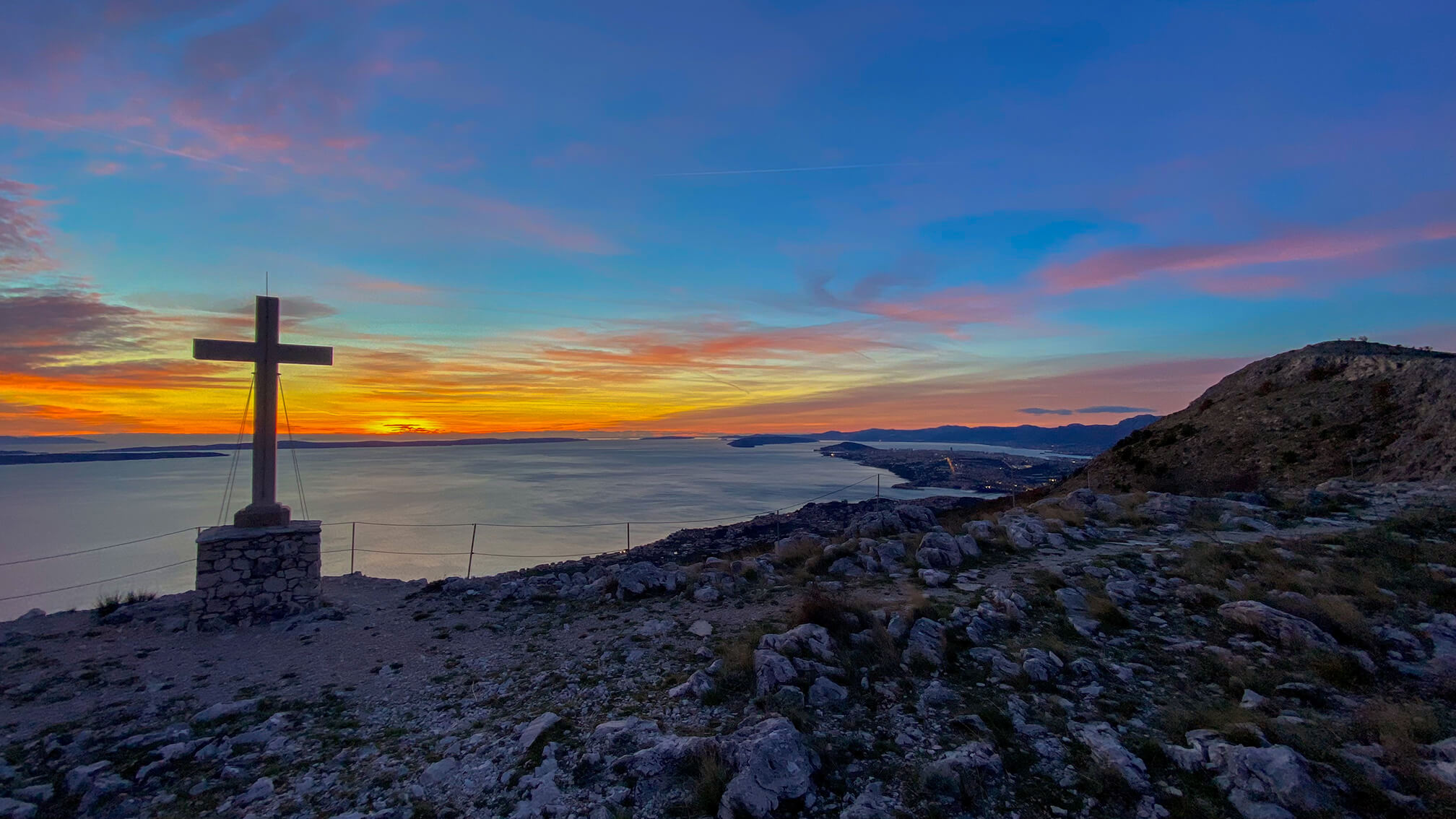
The view from the mountain, in Podstrana, next to the church of sv. Juraj. Below right, you can see the city of Split. (Photo: Jose Alfonso Cussianovich)
Secondly, the little hikes I made to the upper part of Podstrana these last two days, both on a small hill behind my house and on the mountain where the small church of St. Juraj is located. In recent weeks, gray skies, cold weather, and storms prevailed. But when I returned from Zagreb, I found sunny days, warmer weather, and stunning sunsets. The images I captured of these last two days, both in photo and video, speak for themselves. Never in my life have I witnessed such spectacular views, and that’s not an overstatement.
A short video that I recorded and edited in Podstrana, where I live, between December 14th and 15th. The sunsets were spectacular.
Third, the Split Winter Tourism roundtable. I had the great opportunity to be present at the previous meetings and at the great event held at Chops Grill on Monday. Although my role was quite minimal, the important thing for me was being able to listen to many of the people who in recent years have moved mountains to make Split a twelve-month destination and those who could finally make it happen. Self-criticism, ideas, potential collaborations, their will... all this helped me to think that the future in Split can only be better, especially if intentions and actions go hand in hand this time. It excites me to think that, with the skills and ideas that I have, I can be part of that change, in some way.
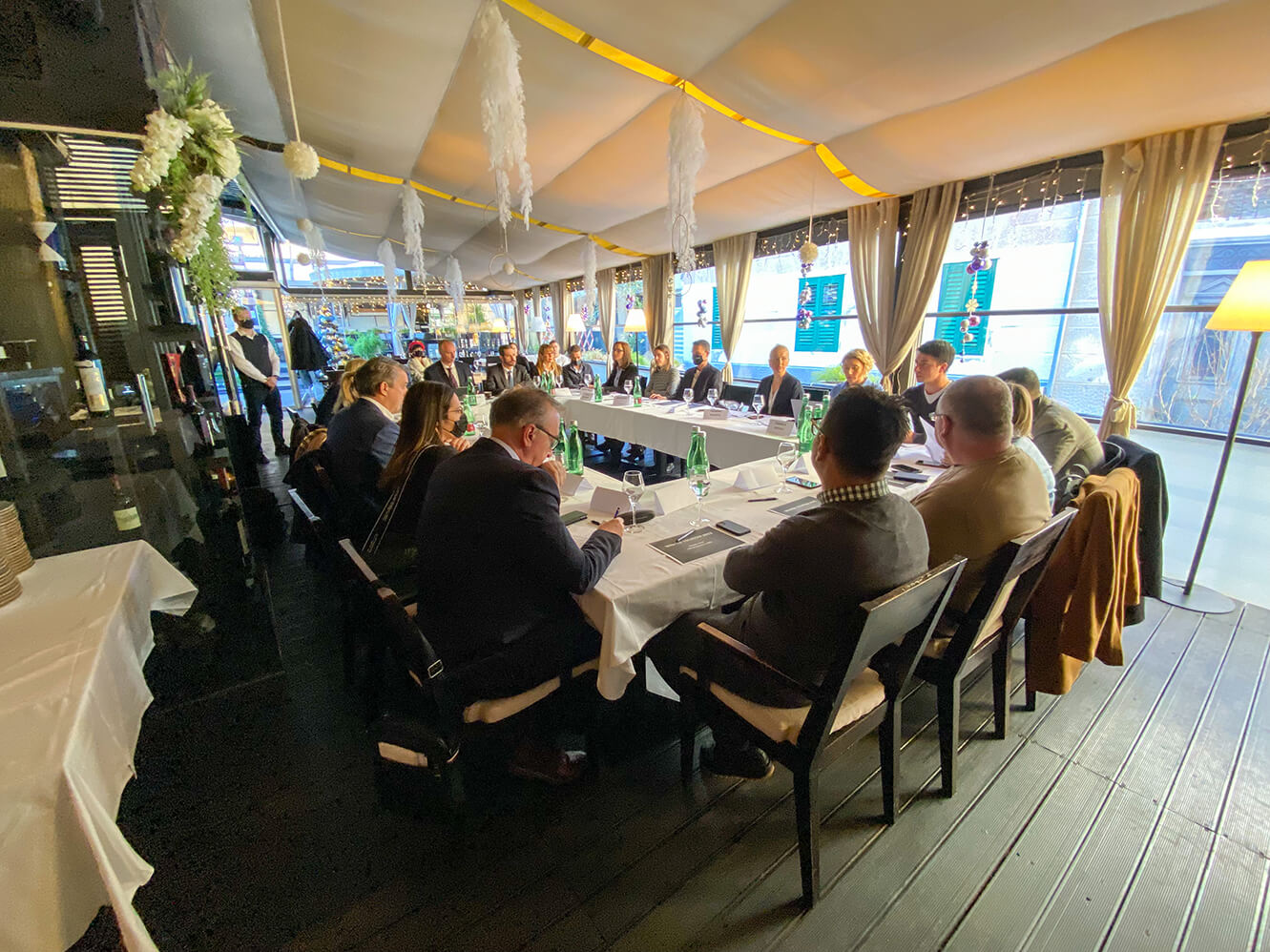
The Split Winter Tourism Roundtable, which was held at Chops Grill on Monday. (Photo: Jose Alfonso Cussianovich)
Fourth, and you probably think that I let it slip when I remembered October: the olive trees. "Who in his right mind chooses one place for another, just for the olive trees?", you might ask yourselves. It is not so much for the trees themselves, but for the experience. I was aware that the olive harvest season began in mid-October, and after missing the opportunity to see it up close at the Olive Picking Competition on the island of Brač, I decided to be more attentive to the slightest chance to live that experience.
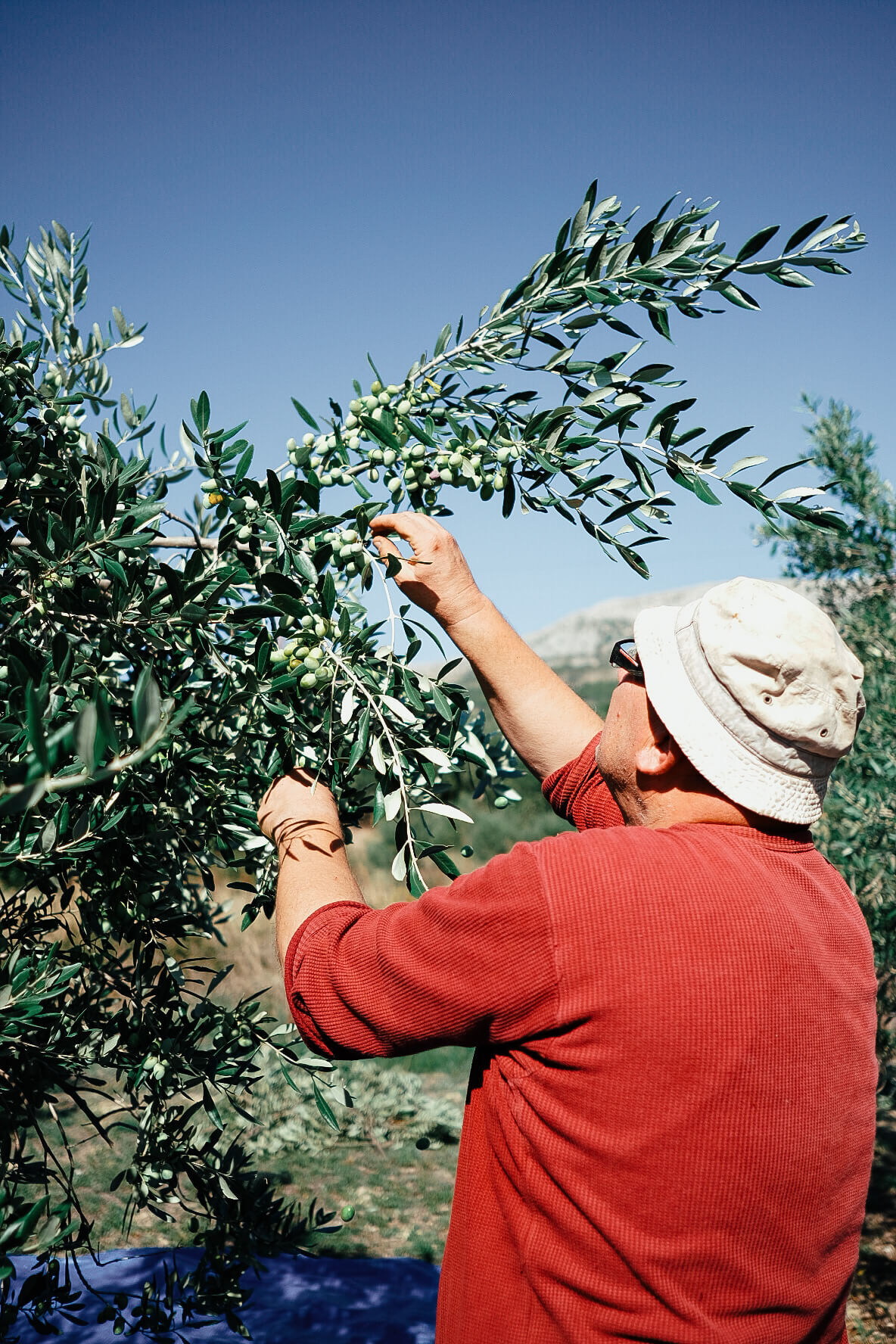
One of the photos I took while accompanying some neighbors from my neighborhood while picking olives from their trees. (Photo: Jose Alfonso Cussianovich)
Fortunately, behind the building I live in, there are many olive trees. For several days I looked to see if someone was coming to collect the olives, and indeed one day it happened. Without thinking twice, I walked there with my camera and asked a family of three if I could take some photos of them and record some videos while they picked the olives. What at first seemed like a journalistic task, turned into a very friendly afternoon in which we shared stories, and especially the father, who told me for hours everything I should know about a tradition as ancient as collecting olives. You know that as you go up the highway towards the mainland, the olive trees begin to disappear. You probably think it's a bit of a silly reason, but I just don't see myself living far from these kinds of experiences. Truth be told, one of my dreams is to have my own olive tree and make my own olive oil. So there you have it.
Last, and maybe most importantly, my Croatian ancestor, Pero Kusijanović, was born in the small district of Mokošica, in Dubrovnik and was, by all means, a true Dalmatian. Pero migrated to Peru approximately 150 years ago, and I don't think he would have ever imagined that his descendants would choose to return and settle in Zagreb, far from the Adriatic. I will honor him, in some way, trying to move my future forward here in Dalmatia.
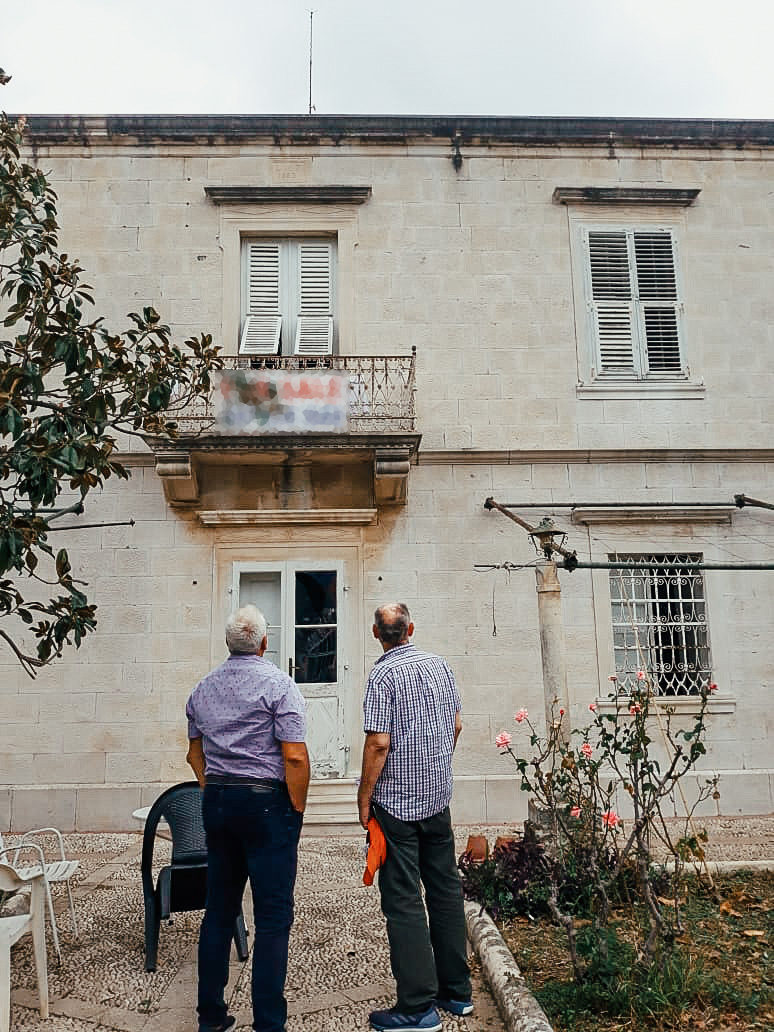
My father (right) visited the house in Mokošica, where our ancestor, Pero Kusijanović, was born and raised. (Photo: Patricia Medina)
I will never regret the experiences and moments lived anywhere other than here. If something makes a country like Croatia special, it is that each of its square kilometers has something prepared for you, and capable of marking you for life. But I do have to admit that there have been times when I underestimated the beauty of living in Dalmatia, and for that, I apologize. Sometimes you don't have to make pros and cons lists to compare one place to another. Sometimes the region has a vibe that is difficult for others to feel or understand, as the great Daniela Rogulj would say.
Many believe that Dalmatia is only the islands and the coast (which alone are good reasons to settle here), but many are unaware of the history and beauty of places Knin or Sinj, the latter I was able to visit at the end of October with my family and really blew me away.
Split, Zadar, Dubrovnik, Šibenik, Ston, Trogir, Korčula, Hvar, Knin, Sinj, Primošten, Omiš, Makarska... how can you forget about these places and many others with such ease? Sometimes it is about what a place already is, and sometimes what a place can become. For the moment, I choose the latter. There’s so much for me to discover here before jumping to conclusions, or Zagreb.
For more, check out our dedicated travel section.
Is It Really True That All Foreigners Living in Croatia are Really Rich?
December 1, 2021 - An article I have wanted to write for a very long time and the perceptions about - and realities of - the wealth of foreigners living in Croatia.
Shortly after I returned from our epic trip to eastern Croatia last month, I posted this on Facebook:
I am genuinely and honestly shocked at how many of my Croatian friends tell me that they have never been to Slavonia. Guys, you are missing out big time. Osijek is the most fun place to be at this time of year.
It didn't take long for the predictable reaction to take over.
It's hard to travel as a local when avg salaries are 4-6000 kunas a month ( $600-1000)
I agree. It is also hard to travel as a foreigner when salaries are 4-6000 kuna a month.
But of course, all foreigners who live in Croatia are millionaires, and all locals earn almost nothing, isn't that the truth?
I decided to rephrase my Facebook post:
Ok, then let's reframe my sentence to suit this narrative. I am genuinely and honestly shocked at how many of my Croatian friends among the 200,000 Croats who go skiing abroad each year tell me that they have never been to Slavonia. Guys, you are missing out big time. Osijek is the most fun place to be at this time of year. How does that sound?
The conversation ended.
And just as there are plenty of rich Croats living in Croatia, so too there are a good number of foreigners living here who struggle to make ends meet each month.
In fact, I would go as far as to say that I probably know more foreigners here who live on or around a Croatian wage than rich expats.
I used to show my bank manager some of the things published on social media by people who had never met me but clearly had an opinion about me. As we finalised the details of a temporary overdraft one time, we laughed at the online claim on some expat forum that I was a millionaire who had retired early and was doing TCN as a hobby.
Life in Croatia is fantastic if you have money, and it is fantastic as a tourist.
Life in Croatia on a Croatian salary is tough.
But for foreigners too.
When I started the Total Project back in October 2011, I had 100 euro in my bank account, as well as two young kids to feed. I have never worked harder or longer hours (or had so much fun with work) as the last ten years. And while life is certainly a little more comfortable now than it was a decade ago, that comfort was generated by a start of 100 euro plus 10 years of hard work.
Unlike the 200,000 Croats who go skiing each year, I could not afford to do that every year, and neither could most of the foreigners living here that I know.
Despite this, my answer to the question Is It Really True That All Foreigners Living in Croatia are Really Rich? would be an emphatic Yes.
For they have discovered paradise and appreciate what they have.
There is a lot more to being rich than having money in the bank.
All the money in the world cannot buy you the safety and lifestyle and incredible experiences available in Croatia if you do not live in Croatia.
And if you have a mindset shift, as many of the foreigners who live here have, the daily struggle to make ends meet is more than compensated by the safety and lifestyle.
I was a lot richer before I came to Croatia, and I also earned a lot more money as a 25-year-old than I do now as a 52-year-old. Do I yearn for that salary and way of life of 27 years ago? Never.
A few years ago, a school friend I had not seen for 25 years came to visit me on Hvar on a family sailing holiday. It was great to catch up, and we traded stories about life and where we had got to in life. He was a hugely successful chartered accountant, a partner in one of the biggest firms. He lived in a large house an hour from London by train, earned a very nice sum. Far, far more than me.
But he also left the house at 6am Monday to Friday, returning home at 9pm, when the kids were already in bed. The babysitter at the weekend cost over £100, and the restaurants and bars with his wife were not cheap. But it was a good life, he reflected.
"And of course, I can take the family on a holiday to Hvar each year," he added.
Yes, he could I reflected, after he sailed back to Split to catch the flight home, and I to my beloved bench in Jelsa to watch the changing colours on the beautiful Biokovo mountain through the Jelsa palm trees across the Adriatic, an experience I could have for free, 365 days of the year.
It is true what they say - all foreigners living in Croatia are really rich.
It is all in the mindset.
Resident Brits in Croatia: Wrongly Stamped Passport Won't Affect Rights
September the 1st, 2021 - We have been receiving many reports of resident Brits in Croatia having their UK passports stamped at the border when entering and/or exiting Croatia. While this shouldn't be happening, these stamps are just a meaningless little souvenir and will not have any effects on your rights under the Withdrawal Agreement (WA).
Brexit has been done and dusted, and while there are still growing pains, the ongoing global coronavirus pandemic has overshadowed most of the infighting and arguing between the bloc and the Northern European island nation. With the economic part of the new relationship between the bloc, of which the UK was a powerful member for 40 years, and the UK still finding its feet, the situation with citizens' rights which plagued those affected for years has all but been cleared up.
There are, just like with everything else, certain issues still. One issue is resident Brits in Croatia having their British passports stamped upon entry and exit. It is important to state that this isn't happening all the time, but it is still happening where it shouldn't be. Here's how you can try to avoid it, and if it does happen, don't sweat it.
If you are a resident Brit in Croatia covered by the Withdrawal Agreement, you'll already (hopefully anyway) have your new ID/residence card which documents that right under Paragraph 4, Article 18 of the Agreement. This protects you and your acquired rights as you had exercised them under the freedom of movement laws which once applied to you as an EU citizen.
When crossing the Croatian border (either entering or exiting), you should always show your Croatian ID/residence card along with your British passport to the border guard in order to avoid any questioning as to your reason for entry/your reason for having been in the country and to showcase your rights.
We've been receiving reports, as stated previously, from Brits who are covered by the WA, some of which had permanent residence before Brexit even happened, who are now having their passports stamped by Croatian border guards. Naturally, this makes them worry for their rights and wonder why they, as legal tax paying residents, are being lumped in with visiting British tourists.
We have investigated why this is happening and have been assured that although it shouldn't be, it isn't anything to be concerned about and it doesn't affect your rights in any way whatsoever. The stamps can be looked upon as a little souvenir which carry no weight. As long as you can evidence that you are a legal resident of Croatia, any stamps you might have collected on your trips in and out of Croatia are meaningless.
Hopefully, as the consequences of Brexit settle and the UK and the EU's new relationship becomes the norm, such situations will stop happening. In any case, there is no need to worry about Croatian passport stamps in the UK passports of resident Brits in Croatia.
If you're a serial stamp collector despite having shown the border guard your ID/residence card and this article fails in easing your concerns, you can contact the British Embassy in Zagreb and voice your worries by clicking here.
For more, make sure to follow our politics section.
Slobodna Dalmacija Features Dubrovnik's Digital Nomads-in-Residence
May 18, 2021 Slobodna Dalmacija brings a story about digital nomads from the Dubrovnik Digital Nomads-in-Residence program.
“We can work four hours, have coffee and make good money”
Croatia is one of the first countries in the world to have adopted the concept of a one-year digital nomad visa.
The City of Dubrovnik and Dubrovnik Tourist Board, in partnership with Saltwater Nomads and TCN, selected ten “official” digital nomads and gave them a rent-free month in Dubrovnik. In return, they expect useful advice on how to create a nomad-friendly atmosphere in the south of Croatia. This type of guest doesn’t crave travelling only in the summer months nor do they sit at home waiting for the pandemic to pass. The project is entitled “The Dubrovnik Digital Nomads-in-Residence program”.

Game of Thrones
In the world of digital nomads, Croatia is renowned as one of the cheaper European countries for a longer stay. Participants in this program are housed in private apartments, some at Akademis "Academia" as well. They admit their knowledge of Dubrovnik was more or less reduced to the city being tied to the role of King’s Landing it played in the popular TV show Game of Thrones. However, Albert Canigueral, a Spanish teacher, writer and documentary filmmaker, visited Dubrovnik back in 2003.
“The city is today pretty empty because of the pandemic. Otherwise, it is visited by numerous tourists. Almost 20 years ago, communication with the local people was much harder than today when almost everybody communicates in English.” – Albert recalls.
His career has involved extensive travel across Europe, North and South America, but this program in Dubrovnik is his first formal digital nomad experience. At the moment, he is researching the issues around the future of work, the future of employment and new technologies in society. Therefore, digital nomadism is his research matter as well. As it turns out, flexibility affects productivity in a positive way.
Paid per project
“If someone takes a walk around the City Walls and has a cup of coffee after four hours of dedicated work, and then continues after taking a break, he is bound to be more effective than someone forcefully seated for eight hours straight in an office. Working from home and flexibility in managing work hours will be a more and more common occurrence. It is not all black and white. Not everyone will be able to work like that, there are jobs that demand the physical presence of the worker and strict hours, but more and more jobs will be organised on a per-project basis with deadlines defined. Also, more and more people will be paid on a “per project” basis than on a fixed salary. Innovation and changes are happening ever faster and the companies are looking for new talent and fresh workforce not on a fixed model, but on individual projects. The metaphor for that type of work is known as a “Hollywood model”. Part of the employees of the film studio are the ones with steady jobs, but for each movie new screenwriters, actors or make-up artists are employed. Imagine every movie had the same actors! For companies, this model works well and it is up to the individual governments to ensure an effective social system and adapt to the new paradigm. Instead of working in the same position for salaries our entire lives, we need to get accustomed to a fragmented system in which the income will have its ups and downs and the social system that will accommodate this.” – says Albert
Flexibility is Key
COVID-19 Pandemic proved to even the most conservative employees how working from home or some other alternative place is not necessarily a bad thing. When asked what advice would she give to a beginner digital nomad on how to build a sustainable career, Charlie Brown considers flexibility to be the keyword. Cyberspace offers indescribable options which she had no idea about until she sold her assets, home and wine shop near London and set out on the path of the nomad. Before Dubrovnik, Charlie was already in Croatia, in Zagreb and Split. For beginners with no work, she recommends the website upwork.com which is packed with offers for hundreds of thousands of work opportunities. Everything is possible, even running a radio show in Texas from Dubrovnik…
Ron Tardiff is a young scientist from the United States who studied in seven different countries, from Europe to China. He believes Dubrovnik to be a logical choice for “workcation”, a rising trend in companies that give employees the opportunity to work from whichever location they prefer for three months of the year.
“Moving for school or work, I have done so much bureaucracy and can therefore tell you it is refreshing to run across a country where you are being welcomed and barriers to entry are being lifted. Looking at it from the perspective of pre-pandemic times, the advantage of Croatia is accessibility, ferry connections to Italy and proximity of Balkan countries that are generating interest among digital nomads. It is wonderful to do some island hopping as well. I have to also admit Croatian roads are some of the best in Europe. If only the trains were equally as good.” – Ron commented
From Costa Rica to Croatia
Mr. Tardiff is in love with the idea that is being developed here and the effort in proving digital nomads can be more than just tourists. He is hopeful other cities will take on the Dubrovnik model. As a scientist, he is particularly interested in the development of the “blue economy”. Considering tourism is the second most important industry in the Mediterranean region and is taking over as the most important one, which is not always a good thing from the standpoint of environmental protection, Ron Tardiff is preoccupied with the issue of reducing the number of tourists or attracting the tourists that create a bigger value for the destination. Like digital nomads.
For the last five years, as the interest of Americans in Croatian tourist destinations grew, Texas-born Kelsey Kay Love put Croatia on her bucket list. She started her nomadic lifestyle eight years ago, travelling from Costa Rica, through Bali, New Zealand, Thailand…
“I’m attracted by situations that will get me out of my comfort zone, which is inherent in the digital nomad lifestyle. Having a stable job is a huge advantage” – Says Kelsey, a brand manaer for a luxury alcoholic beverage brand co-owned by Bruno Mars. She worked as a travel writer in the past for numerous travel websites and tour companies in Maui and Australia. Is she worried about her financial security?
“Oh yes! Luckily, I have been holding on to the same job for almost two years now, so I am pretty relaxed. One needs to be persistent, creative and willing to take an occasional risk. Do you know how to make website, write, or manage social media? There are many jobs you can do. It was easier for me in New Zealand where I had a work visa, compared to Asia. Now Croatia is offering digital nomad visas, which is great. I think one year is the right duration for the visa.” – says Kelsey.
Price of Accommodation
Ron Tardiff emphasizes nomads never spend all the money they make and they take great care that the costs of living in a country they’re residing are lower than those of the country their employer is from. This is a chance for Croatia which offers the possibilities of cheaper longer stays than many other countries. When asked about the most important considerations when choosing a destination in which to spend a month or more, our interviewees first emphasize the cost of accommodation. There are cities with a high cost for short stays, but the accommodation owners are willing to accept reasonable monthly rates. Furthermore, good internet connection ranks very high, as does affordable transportation, whether public transportation or rent-a-car, the proximity of an international airport, safety, nature, pleasant climate, and community of digital nomads or expats. They are trying to avoid overcrowded cities where tourism has a negative effect on the quality of life.
Internet Speed
Global nomad network nomadlist.com has 210 reviews for Dubrovnik. The average city score is 3,41. Digital nomads speak highly of the speed of the internet, workplaces, quality of life, safety and education levels. Negative comments usually have to do with nightlife, air-conditioning systems and smoking in public areas. There are mentions of difficulties in forming friendships and hostility towards women and members of the LGBT community. Out of all the above, nomads we’ve interviewed jokingly comment how the rental properties are obviously geared towards the summer rentals and cooling rather than heating. Those that have already been to Croatia say the locals are very kind people and they suffered no unpleasantness. They say the scores on websites like this have no great bearing on their decisions to travel to a certain destination, but they do check all the available information before their trip. When asked what about the main advantages to Dubrovnik and Croatia, they emphasize pleasant weather and a relaxed lifestyle.
“You have the Mediterranean lifestyle, access to great beaches especially in the summer, all going in your favour. Croatians are very gracious hosts! The most beautiful side to being a nomad is not having to base yourself in one spot. Therefore, you don’t have to select living in just one Croatian city. I can spend one month in Dubrovnik, the next one in Split, or in an undiscovered continental part of the country” – says Charlie Brown.
Split is Cheaper
Ron and Albert agree. According to them, one thing that makes life easier is the fact most people speak English well. Ron objects to the location of Dubrovnik. Although he would gladly return to it, cities in central Dalmatia seem like a more sensible choice for a digital nomad’s base. Split is somewhat larger and somewhat cheaper. Seeing how Croatia is at the top of his list of countries in which to live for years now, after Budapest, that will probably be his destination of choice.
Interesting to note is their stance on medical insurance. Before the pandemic, they mainly risked and had no insurance coverage, but COVID-19 made them more cautious. Charlie Brown says she is still upset about Brexit, but still holds a medical coverage card that is valid in EU countries. In situations when that kind of solution is not possible, digital nomads are partially reliant on travel insurance which, they argue, do not work always or everywhere. With the work visa in Australia and New Zealand, Kelsey was insured as any other employee, but this is rarely this simple. After her partner contracted denga fever in Thailand and spent 48 hours in the hospital having to do MRI and similar tests, travel insurance wasn’t going to cover his expenses, so they ended up paying USD4000. They still feel they got off lightly considering the prices in their homeland. Ron remembers having to do appendicitis surgery in Greece a year ago. His German travel insurance covered the cost.
“I’m at a Gain”
“I come from the United Stated of America, the country with the most expensive healthcare in the world, so even if I had to pay for a medical service out of my own pocket here, it would be cheaper than a medical insurance policy in USA. I don’t have dental insurance. The basic one I have at the moment doesn’t cover tooth breakage, but if I went to the dentist here, it would cost me 10 to 15 times less than in the USA. So, I am at a gain. People joke about this, but it is cheaper to fly here from America, get a cocktail, have your teeth fixed and fly back, then to do it back home.” – says Ron and adds: “I am not worried about health insurance because it cannot be more expensive than back home”
When asked where they would prefer to live, Ron chooses Greece, although he notes difficult bureaucracy as the main problem for someone coming from United States. Although he went to school in Greece, he can’t be employed there. Some of the most attractive countries for nomads also have the most barriers for staying there, but this rarely deters them.
“Before this program, I was torn between going to Portugal or Croatia, and now I am one hundred percent certain about coming here. Dubrovnik surroundings are peaceful with beautiful nature, and everything is more straightforward than in Portugal.” – says Kelsey Kay Love
Saltwater Nomads' Tanja Polegubic on the Dubrovnik Digital Nomads-in-Residence Program
Dubrovnik Mayor Mato Frankovic on Digital Nomads, US Flights, 2021 Season
Learn more about the Dubrovnik Digital Nomads-in-Residence program.
For the latest digital nomad news and features in Croatia, follow the dedicated TCN section.


